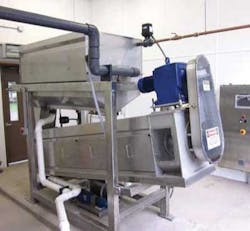Lessons from Japan
Having lost his water supply temporarily, Tom Freyberg reflects on the role of the sector and how the perception in the public eye changes when things go wrong. How Japan handled the tsunami aftermath is a lesson to all of us, he says.
Just as this issue of WWi was going to print, the unthinkable happened: my water supply was cut off. Cue panic, hysteria and outrage. And this was just from my partner. A quick phone call to the local water company and we were informed about the situation. There had been a problem elsewhere in the community and the supply was switched off. This situation got me thinking. I know, dangerous.
Inevitably other householders in our local town probably also suffered from minor panic attacks when they went to turn on the tap. In most developed countries water supply, and the companies/processes involved in getting it there, are generally taken for granted. That is, until it stops. Our industry is one of the most under praised and undervalued industries operating in this world today. We are quite literally 'behind the scenes' in one of life's most important stage productions. The audience only see and really appreciate the polished actor on the stage, or the water out of the tap, as the finished product. The difference is that if the actor has a bad day, fluffs their lines or trips up, then they are immediately blamed, not the numerous people working behind the scenes.
How different this is for the water industry. During my personal water hiatus my partner immediately criticised the water company, questioning where the money from our bill is spent. I responded that our annual water bill is cheap for the water we use. Clearly, this was not the time for the 'is water to cheap?' debate! Anyway, a couple of hours later and my calming measures were not needed: water supply was back to normal. What a relief.
Our industry works hard everyday to ensure the happiness and wellbeing for the worldwide population. As soon as water comes out the tap slightly discoloured, or odorous, then the finger of blame is immediately pointed. Or if, during continuous spells of hot weather, a hosepipe ban has to be enforced to conserve supplies. Unfortunately people don't think: 'Ok, we understand the challenges faced here on water demand, let's conserve our water: take showers, not baths and leave the car dirty for a couple of weeks'. The immediate reaction is instead: 'WHAAAAT? How will I be able to wash the car, or water my prize flowers?!'
I recently spoke with the delightful Yoshihiko Misono from the Japan Water Works Association (JWWA). During his keynote address in Washington Misono highlighted the devastating impact the earthquake and subsequent tsunami had on the country's water supply, now four months ago. Immediately after the earthquake, there were 1.6 million people without access to drinking water. Within a mere 10 days, this number has halved. Now it stands at just over 50,000. A remarkable rehabilitation effort.
What astounded me was his account of the community sites handing out water during the aftermath. You would expect the 1.6 million people, most without homes, possessions and even family members, to be disorderly, frantic and desperate for life's necessity: water. The reality was quite the contrary. Instead, the Japanese populations were orderly, polite and calm. Riots and looting were nowhere in sight. This was a great reflection of Japan's calm and civilised culture. See page 14 for the full interview write up.
On the subject of Asia, I'm just packing my suitcase for the Singapore International Water Week. Again this year we will be filming numerous high profile, video interviews with industry leaders and reporting on the latest developments from the country.
I look forward to catching up with many of you again. Enjoy the issue.
More Water & WasteWater International Current Issue Articles
More Water & WasteWater International Archives Issue Articles

